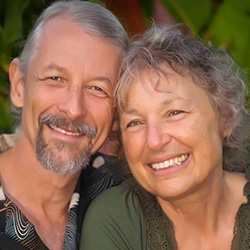

NVC Resources on Self-Connection
-
When deciding if someone crossed your boundaries and how to respond, you may get conflicting opinions on it. These opinions can be coarse attempts to manage life with rules about what should(n’t) happen. Instead, so that you can find where you want to invest your energy, ask yourself questions that reveal what for you is truly in integrity, nourishing, connects to your heart, and deepens self understanding. Read on for examples.
-
Come fall in love with yourself again…
In this course recording, facilitated by Arnina Kashtan, you will discover your ability to...
- Simply love yourself…
- Live fully and express your greatness in the world… and
- Shorten the way to realizing your true self!
Arnina will share with you the deepest process of self-connection and meaningful discovery. You will learn how to listen to your innermost self, discover how to lead a life that is much more than anything you have ever dreamed of, and fall in love with yourself all over again!
-
When Dian works with managers, they often ask how they can manage others more effectively. She almost always asks them: how are you managing yourself?
This question applies to all aspects of life, both at work and at home. How are you: 1) gaining clarity around your needs; 2) managing your internal reactions; and 3) clarifying your requests before you open your mouth (or judge) others? This is why self-empathy – which Dian calls “self-management,” now a buzzword in business – is central to the practice of Nonviolent Communication.
Yet self-empathy is not always easy, especially if events in your life stimulate old, “fossilized” needs. These “fossilized” needs are often precognitive and connected to trauma, and as a result, “live” in your muscle memory. In order to fully release this “stuck” energy, it is necessary to engage your felt-sense while learning to empathize with your body and deeply connect with your younger parts.
Dian calls this process Somatic Self-Empathy (SEE).
-
NVC trainer Sarah Peyton explores the process of repairing relationships through the lens of Nonviolent Communication. She emphasizes the importance of self-connection and empathy—both for ourselves and others—when addressing moments of hurt or disconnection.
-
CNVC trainer Yoram Mosenzon shares how expressing specific and authentic appreciation can deepen connection in intimate relationships. He emphasizes the importance of making clear observations without judgment and connecting with the feelings and needs that arise from meaningful gestures.
-
Anger and resentment can signal unmet needs. Through mourning those needs and practicing self-empathy, we may let go of blame, embrace reality, and reclaim responsibility for fulfilling our own needs. This process may lead to emotional transformation through conscious reflection, and a new outlook.
-
Yoram Mosenzon explores the core NVC principle that others do not cause our feelings—our interpretations and unmet needs do.
-
Even leaders we admire may exhibit behaviors that could be labeled as abusive, at least slightly. This includes not treating followers as equals, using charm, and hiding or twisting truth. In such scenarios a key reason for this is loneliness. If we're using our work and position primarily to gain for appreciation, acknowledgement, and acceptance then we need to examine our own loneliness. We need feedback to keep such conduct in check.
-
John Kinyon shares how self-connection and mourning help balance your needs with others’.
-
Jim Manske demonstrates using NVC and self-connection to create sincere, healing apologies.

Quick Links
Subscription Preferences
Stay In Touch!
Looking for ways to keep up with NVC Academy news, get special offers, free resources, or words of inspiration? Here are five ways to stay engaged:









